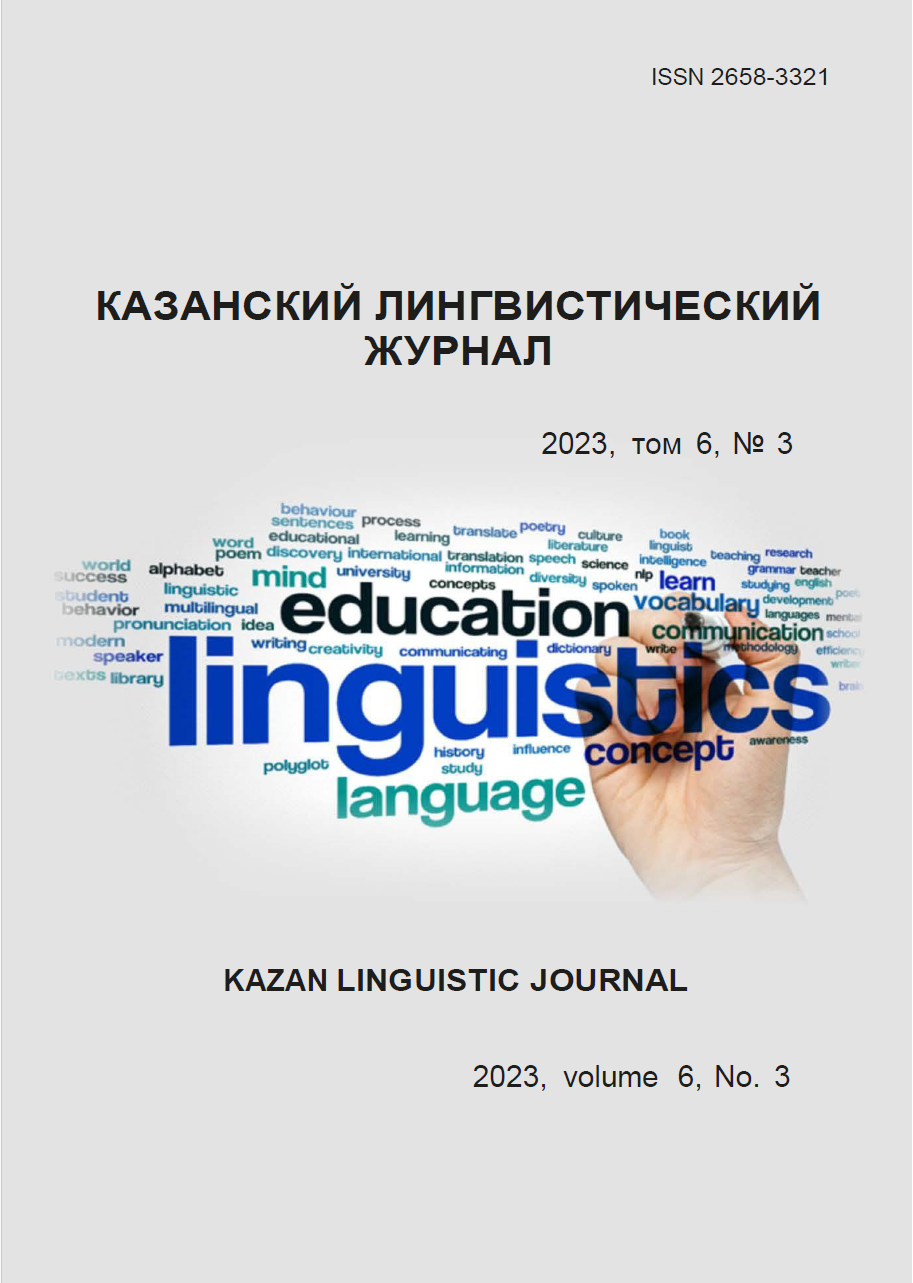The extensive use of Chinese and English kinship terms: a comparative study
https://doi.org/10.26907/2658-3321.2023.6.3.344-354
Keywords:
kinship term, extensive use, Chinese language, English language, semantics, pragmatics, cultural connotationAbstract
The article deals with the comparative analysis of the extensive use of kinship terms in Chinese and English languages. Extensive use is defined as the use of the kinship term towards a non-relative person. The aim of the research is to conduct a comparative study of the extensive use of the Chinese and English kinship terms from the point of view of the theory of semantics, pragmatics and relationship between language and culture, using the methodology of comparative and contextual analysis. The obtained results allowed us to determine the culturally specific features of the extensive use of Chinese and English kinship terms. Therefore, kinship terms are studied not only as a language phenomenon, but also as a result of the development of the society and as a symbol of social culture.
The research demonstrates the complex and strict system of kinship terms in the Chinese language and discusses the key similarities and differences from the extensive use of kinship terms in the English language. Examples are provided demonstrating the extensive use of kinship terms under the influence of social and cultural factors. We prove that the extensive use is represented considerably more broadly in Chinese compared to English. The significance of the obtained results is seen in the evolution of intercultural communication practices in order to avoid misunderstanding and communicative failures.
References
References
Pan Pan. On the extensive use of kinship terms. Language and writing applications. 1998; 2. Available from: http://qikan.cqvip.com/Qikan/Article/Detail?id=1002373070 [accessed: 20.03.2023].
Hongji M., Qingfeng C. Address Terms. 1998. Available from: https://books.google.ru/books/about/%E7%A7%B0%E8%B0%93%E8%AF%AD.html?id=PzYEAQAAIAAJ&redir_esc=y [accessed: 26.04.2023].
Hu Shiyun. A study of Chinese kinship terms. 2007. Available from: https://books.google.ru/books/about/%E6%B1%89%E8%AF%AD%E4%BA%B2%E5%B1%9E%E7%A7%B0%E8%B0%93%E7%A0%94%E7%A9%B6.html?id=M45JAQAAIAAJ&redir_esc=y [accessed: 24.03.2023].
Thomas E.M. A New Look at Address in American English: The Rules Have Changed. 2002: 43–61. Available from: https://ans-names.pitt.edu/ans/article/download/1651/1650 [accessed: 19.03.2023].
Zubrzycki J. Polish immigrants in Britain: A study of adjustment. The Hague: Marti-nus Nijhoff. 1956: 176. Available from: http://www.wenqujingdian.com/Public/editor/attached/file/20180620/20180620111055_51000.pdf [accessed: 20.03.2023].
Ervin-Tripp S. On sociolinguistic rules: Alteration and co-occurrence. In: Gumperz, J. and Hymes, D. (eds.). Directions in Sociolinguistics. New York: Holt; 1972. Pp. 213–250. Available from: https://files.eric.ed.gov/fulltext/ED019656.pdf [accessed: 20.03.2023].
Resources for Neology Research. Available from: http://ling.cuc.edu.cn/newword/showWordResult.aspx?page=4 [accessed: 03.03.2023].
Го Лихун. Сопоставительный анализ термина родства в русском и китайском языках. 2019: 108–111. Available from: https://elib.bsu.by/bitstream/123456789/219655/1/108-111.pdf [accessed: 05.04.2023].
Yu Yuan, Han, Yong Su. Suggestions on Teaching Chinese as a Foreign Language to Popular Appellations on the Internet. 2021;(61):147–167. Available from: https://www.kci.go.kr/kciportal/ci/sereArticleSearch/ciSereArtiView.kci?sereArticleSearchBean.artiId=ART002748141 [accessed: 10.04.2023].
Kamensky M. V. A Heuristic Approach to Extending the Cognitive Classification of English Discourse Markers. Voprosy Kognitivnoy Lingvistiki. 2018;4(57):143–150.
Butorina E. E., Kamensky M. V. Theoretical Foundations of Modelling the Concept “Friendship” as a Linguocultural Universal. Vestnik Pyatigorskogo Gosudarstvennogo Universiteta. 2020;(3):89–93.
Martynov D. E., Glushkova S. Yu. Athanasius Kircher’ theory of the Chinese lan-guage appearance. Kazan Linguistic Journal. 2019;2(3):73–85.
Davletbaeva A.F., Fatkullina F.G. The semantic properties of the modal verbs 愿意 (yuànyì), 乐意 (lèyì), 情愿 (qíngyuàn) in Chinese. Kazan Linguistic Journal. Казанский лингвистический журнал. 2020;3(2):5–18.






